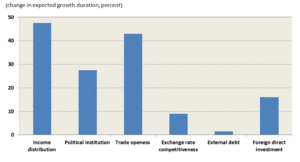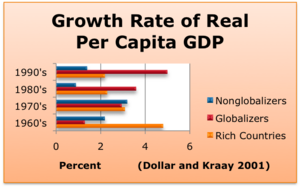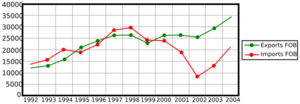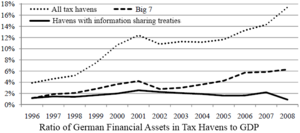Economic globalization facts for kids
Economic globalization is about how countries around the world become more connected through trade, money, and ideas. It means that goods, services, money, technology, and information move easily across borders. Think of it as the world's economies becoming more like one big, connected marketplace.
This connection has been growing for a long time, but it sped up a lot because of better ways to transport things, amazing advances in communication, and new technologies. Agreements like the World Trade Organization (WTO) also helped by making it easier for countries to trade with each other. This means countries lowered barriers that stopped goods from moving freely.
How Globalization Grew
A Look Back in Time
Economic globalization has a long history. As far back as 6500 BCE, people in places like Syria were trading animals and tools. In ancient Sumer, they even used a token system for money.
Markets for workers (labor markets) and money (capital markets) have also been around for a long time. Early labor markets helped farmers get workers for their crops. Capital markets grew when businesses needed more money than one person could provide.
Technology's Big Role
World War I slowed down global trade because countries started putting up barriers to protect their own businesses. But things changed again with new inventions.
In 1956, the invention of shipping containers and bigger ships made it much cheaper to move goods around the world. This helped global trade grow again. Since then, even more technology, like the internet and faster communication, has made global trade expand even quicker.
Governments and Rules
After World War II, countries started working together to make trade easier. The General Agreement on Tariffs and Trade (GATT), which later became the World Trade Organization (WTO), helped countries lower taxes and rules on imports. This made it simpler for goods to cross borders.
A big change happened in 1986 when the London Stock Exchange made new rules. This allowed financial markets around the world to connect more easily, leading to a huge increase in money moving between countries. This event was called the "Big Bang."
More and more countries joined the WTO, including China in 2001. This meant they agreed to follow international trade rules. These changes helped companies move their factories to places where it was cheaper to make things, like China.
Governments are also working on new rules, like the one in 2018 to stop big companies from avoiding taxes by moving their money to different countries.
Who Makes Globalization Happen?
Global Organizations
Many groups help connect the world's economies. International governmental organizations (IGOs) are groups created by countries working together on shared problems like peace or economic issues. Examples include the United Nations and the World Bank.
Non-Governmental Groups
International non-governmental organizations (NGOs) are groups like charities or advocacy organizations. They often provide help to developing countries, sometimes even more than governments do.
Businesses
Since the 1970s, big companies called multinational businesses have started making their products in many different countries. They do this to find cheaper ways to produce things or to get closer to their customers. This means that parts of a product might be made in one country, assembled in another, and sold in a third. This is called a global supply chain.
Companies also learn to work with people from different cultures. This helps them expand their markets around the world.
Immigrants
When people move to a new country for work, they often send money back to their families in their home country. This money, called remittances, helps their relatives. Immigrants also share ideas and business practices, and they can bring their savings with them, which helps the economy of their new home.
What Are the Effects?
Economic Growth and Less Poverty
When globalization sped up, the world saw faster economic growth and a big drop in poverty. Countries that became more connected to the global economy grew much faster. For example, the income of the poorest people in Malaysia grew by 5.4% each year. Even in China, where there's still some inequality, the poorest people saw their income grow by 3.8% annually.
Many countries have seen a big drop in the number of people living in extreme poverty. This means that the gap between rich and globalizing nations is getting smaller.
Global Supply Chains
A global supply chain is like a giant network that helps companies make and deliver products all over the world. Companies use these chains to find the cheapest ways to produce things. This means that a product might start as raw materials in one country, be processed in another, and then assembled in a third before being sold to you.
Working Conditions and the Environment
"Race to the Bottom"
Some people worry that globalization can lead to a "race to the bottom." This means that companies might try to find countries with the lowest wages and weakest rules for workers and the environment to save money. This can lead to poor working conditions, low pay, and pollution.
However, if there's a lot of demand for workers in these low-wage countries, wages can go up. This has happened in places like China and India, where wages have increased a lot. People also start demanding better protection from their governments.
Health and Safety
In some developing countries, workers, especially women, might have to work very long hours in unsafe conditions. For example, women in agriculture might handle dangerous chemicals without protection. This can lead to health problems.
After a terrible factory collapse in Bangladesh in 2013, where many workers died, the country has worked to improve safety rules.
Fair Trade Movements
Groups like the fair trade movement and the anti-sweatshop movement are working to make the global economy more fair. The fair trade movement helps farmers and producers in developing countries get better prices for their goods and improve their communities. They believe in "trade, not aid." The anti-sweatshop movement protests unfair treatment of workers by some companies.
Labor unions also work to improve conditions for workers, especially when companies can move their operations to other countries.
Money Leaving a Country
Sometimes, a lot of money or assets quickly leave a country. This is called capital flight. It happens when people or businesses worry about a country's economy, perhaps because of new taxes or problems. This can make the country's money worth less and cause financial difficulties.
For example, in 2012, a lot of money left Greece because of worries about its economy. This can make it harder for businesses to get loans and can hurt international trade.
Inequality
While economic globalization has helped reduce poverty globally, it has also sometimes increased the gap between rich and poor within countries. However, overall, the difference in income between rich and poor countries has lessened as developing countries have grown rapidly.

Countries like China and India have seen their average incomes double in just 20 years, which took much longer for countries like the US. This growth has led to better living standards, longer life expectancies, and more education for people in developing countries. For example, more children are going to school instead of working.
However, economic growth can also mean that people with more education and skills get higher-paying jobs, which can increase inequality. Governments can help by funding education.
Resource Security
A recent study found that economic globalization has made global supply chains less secure when it comes to resources like water, energy, and land. Many countries rely on other nations for these resources, which can create risks if those sources become unstable.
Competitive Advantages
Businesses in developed countries often have more advanced technology and better ways of doing things. This can make it hard for smaller businesses in developing countries to compete. For example, large farms in Western countries use big machines, while farms in developing countries might rely on manual labor.
On the other hand, cheaper labor in developing countries allows them to compete for jobs in industries that need a lot of workers. The idea of competitive advantage means that countries tend to focus on producing what they are best at, which can lead to a more balanced global economy over time.
Tax Havens
A tax haven is a country or place where taxes are very low or don't exist. Companies and wealthy people might move their money there to avoid paying higher taxes in their home countries. This creates competition between governments to attract businesses.
Some reports suggest that trillions of dollars are hidden in tax havens worldwide. This can mean less tax money for governments, which might affect public services. Some people worry that tax havens are linked to illegal activities.

Cultural Effects
Economic globalization can also change cultures. As money and people move around the world, cultures can mix. People might start using the same language (like English), listen to similar music, or adopt similar habits, like eating fast food.
George Ritzer wrote about "McDonaldization," explaining how fast-food restaurants like McDonald's spread globally, and how other businesses copied their expansion model. This means that similar types of businesses and products can be found in many countries.
Global media companies, like CNN or BBC, also share information and entertainment worldwide. This often means that Western ideas and products are seen by many people.
Migration
Millions of people live outside their home countries today. Thanks to advances in technology, it's easier for people to move between countries. This international migration connects people and economies even more.
See also
- Capitalist peace
- Economic union
- Fiscal localism
- Foreign direct investment
- Free trade
- Globalization
- Internationalization
- Jihad vs. McWorld
- Lists of free trade agreements
- Military globalization
- Mundialization
- Neoliberalism
- Trade globalization
- World economy
 | Mary Eliza Mahoney |
 | Susie King Taylor |
 | Ida Gray |
 | Eliza Ann Grier |




